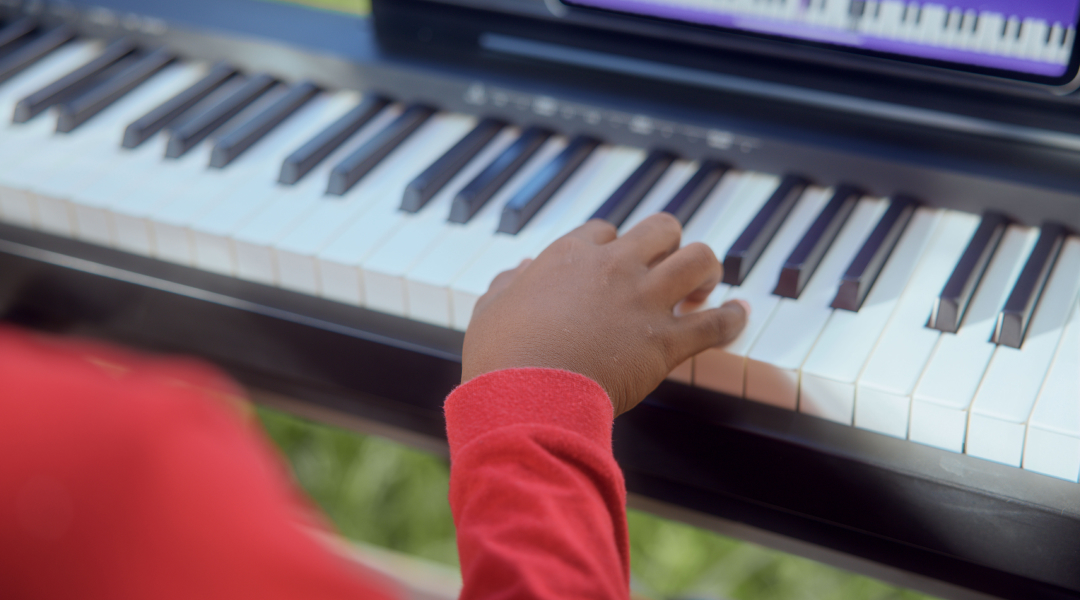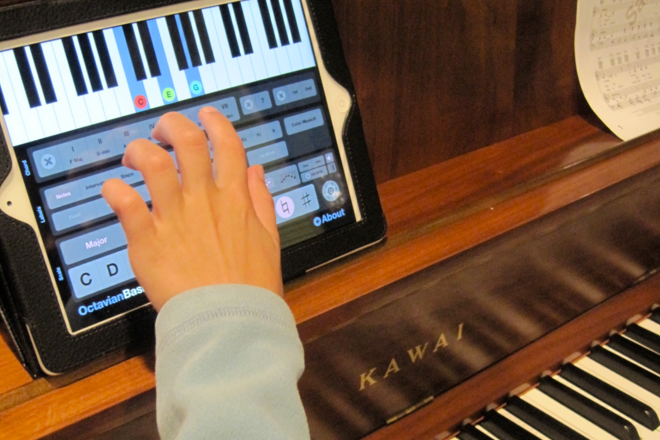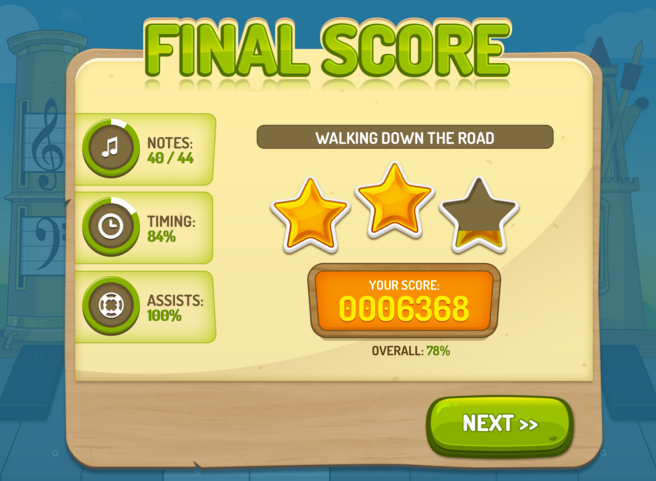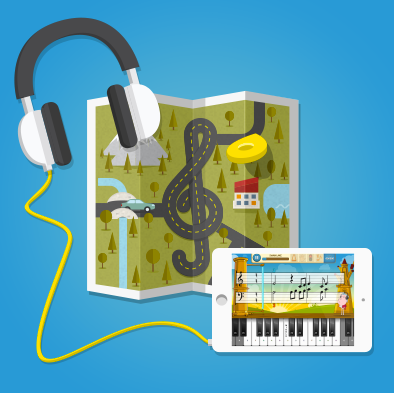F.U.N. is not a 4-letter word
As the new academic year approaches I want to pose a couple questions to all the teachers out there: are your students having fun? Do you think fun is an essential part of the lesson experience?
I sometimes hear the idea batted around that fun piano lessons are somehow less serious or less productive and/or not goal-oriented. I’m here to challenge that idea and tell you why F.U.N. is an essential element in any successful piano studio.
As a teacher my ultimate goal is to pass a love of music and piano-playing on to each and every one of my students. I play the piano because it’s fun. I want students to have fun and to look back on their lesson experience as a positive aspect of their childhood and to still want to sit down and play when they’re in their 20s, 30s, and beyond.
Tip: With my over-stressed teens I remind them each week that piano playing is their deadline-free activity. Just taking the “due date” mentality off the table is enough to relax them and opens up the experience to be fun, enjoyable, and most often a stress-reliever.
My personal definition of a fun lesson experience is a student leaving the lesson excited, motivated, and feeling confident enough to go home, work on their assignments, and be ready to move on to more material the following week. Closely linked to the fun experience factor in lessons is the perception of personal progression which is what keeps us motivated in any endeavor. In the beginning of the lesson process this is easy because there are new concepts introduced often and the forward trajectory is apparent. As students hit those inevitable hurdles in their progression it is easier for stagnation and complacency to set in when it isn’t as easy to sense that progress. The changes are smaller and therefore harder to perceive. As teachers we need to constantly adjust our approach to make sure that the students (not just us as teachers) perceive their own improvements.
Tip: If you’re having one of those days with a student here’s how to turn it around. I like to pull out their assignment book and flip back to the same date one year ago and review with them what they were playing back then. Students have a tendency to get bogged down in the present and always forget where they were. This is often just the wake-up call they need to get their engines revved up again.
Things were much different back in 1994 when I first started teaching. Back then piano lessons were competing with, at most, another sporting activity, homework, and after-school cartoon watching. Twenty years later the piano-lesson landscape has changed drastically, and therefore we as teachers need to make sure we are adjusting our teaching styles. Today we are competing for the attention of our students as they try to balance an ever-increasing homework load, multiple sports, club teams, dance lessons, AP courses, scouts, etc. Out of 168 hours in the week, the small fraction of time you spend with a student needs to be memorable enough to grab their interest so that they will carve out time to devote to the piano during their non-lesson hours. I don’t think of this as pandering or catering to kids – in my mind this is adjusting to the needs of our students and being effectiveas a teacher.
Tip: It’s always good to have goals in mind – and as teachers it’s our natural inclination to have milestones for our students. BUT, I find that with a lot of students it’s better not to mention all these goals out loud because it can overwhelm them and suddenly piano lessons seem to be a lot like school (and let’s face it, for some students school isn’t fun). Instead, I wait and when a milestone I’ve had in my mind is reached that’s the point when I mention it to the student (and make a very big deal out of it). The student most often doesn’t see what they’ve accomplished as such a big deal because they’re already at the destination and they tend to disregard the difficulties and work that went into achieving that goal and suddenly the achievement is placed into the “well that wasn’t so hard” category.
So are you ready to take your studio to the next level? Maybe you’re already having fun in lessons, but here’s a few tips that I think will lead to happier students and a bustling studio that is always fully-booked – and it’s all about F.U.N.
“F” is for FAMILIARITY. My Piano Pronto method book series was conceived in large part out of years of teaching and finding that time and time again students of all ages are motivated by recreating tunes that are already familiar to them. This is linked back to what I mentioned earlier about perceived progress. When students can confidently go home and know that they are practicing something correctly because they are already familiar with it chances are that they will carve out more time to practice during their non-lesson hours.
Practicing effectively is a battle we wage from the very beginning with students. Luckily there are great assessment tools out there these days to help students do exactly that. I’m a huge fan of the iPad app Piano Maestro by JoyTunes because it offers instant feedback for students when they practice their Piano Pronto materials at home – all wrapped up in an awesome game format! If you’ve yet to discover this awesome teaching tool you can read all about it at HERE and get a month FREE membership if you use this code: JTS1MJENNIFER.
“U” is for UNIQUE & USER-FRIENDLY. Are you using the same method books you were using 10 years ago? Do you stick with certain materials mostly because you are familiar with them? Do you tailor materials to fit each individual? Are you afraid to teach pop music because there are just too many fads to keep up with? Are your students proud to present what they’re playing for their peers?
I want to challenge you to consider your teaching materials and ask yourself if they are unique and user-friendly, or just the same old stuff that everyone else is probably teaching. The publishing landscape is changing quickly due in large part to a surge in self-publishing houses that offer new and fresh materials for students and teachers—materials that are often times more in line with the tastes of most students. It is an exciting time for you as a teacher as you are no longer bound to big publishing-house releases or whatever your local music store has in stock.
Apps like Piano Maestro solve the pop music problem for you as you will find loads and loads of current hits right inside the app. You will be amazed by the amount of time your students will choose to spend at the piano when they’re playing familiar music that they love. The user-friendly nature of the app itself ensures that the practice time is spent effectively. The “Learn” mode offered on most of the material in Piano Maestro, brilliantly breaks down songs into sections and walks students through a thoughtful learning progression. Chances are they will transfer this same learning progression into their other repertoire so it’s like having their teacher with them for the entire week!
“N” is for NEIGHBORHOOD NICHE. This is mostly on the business-side (you know the stuff that a lot of us would rather not think about). This may be hard to hear but if you are losing students, or if you’re having a hard time obtaining new clients it may be time for a change. Are you offering a niche service for your area? What makes studying with you a unique experience?
I found the most success as a teacher when I stopped doing what everyone else was doing and carved out my specialty areas. For me those items are: incorporating technology into lessons, using technology to teach composition, and focusing on popular music styles and unique repertoire. Set yourself apart from the crowd and word-of-mouth will drive more business towards you.
Once you decide on your niche(s) strive to hone these skills and don’t ever stop fine-tuning your methods. Are you hard up for ideas? Feeling a bit lost, unmotivated? There are a number of great groups on Facebook where you can find daily discussions about everything under the sun about our field. I moderate once of the largest groups on Facebook, Piano Teacher Central, where you will find loads of information about teaching materials, business practices, how to deal with student issues, etc. It is a closed group, meaning only group members (who are screened before they are admitted to the group) can see the posts. Think of it as your new virtual water cooler.
For those interested in the Piano Maestro app the JoyTunes Teachers group has lots of cool ideas and it is THE place to keep up with the latest news about Piano Maestro.
Here are a couple other groups that are great for ideas to help you carve out your niche:
Piano Teacher FunMakers Group – moderated by Joy Morin and Susan Paradis and focused on off-the-bench activities.
iPad Piano Teachers Group – moderated by tech guru Linda Christensen answers all your pressing iPad queries.
So are you ready to have F.U.N. in your studio this year?









